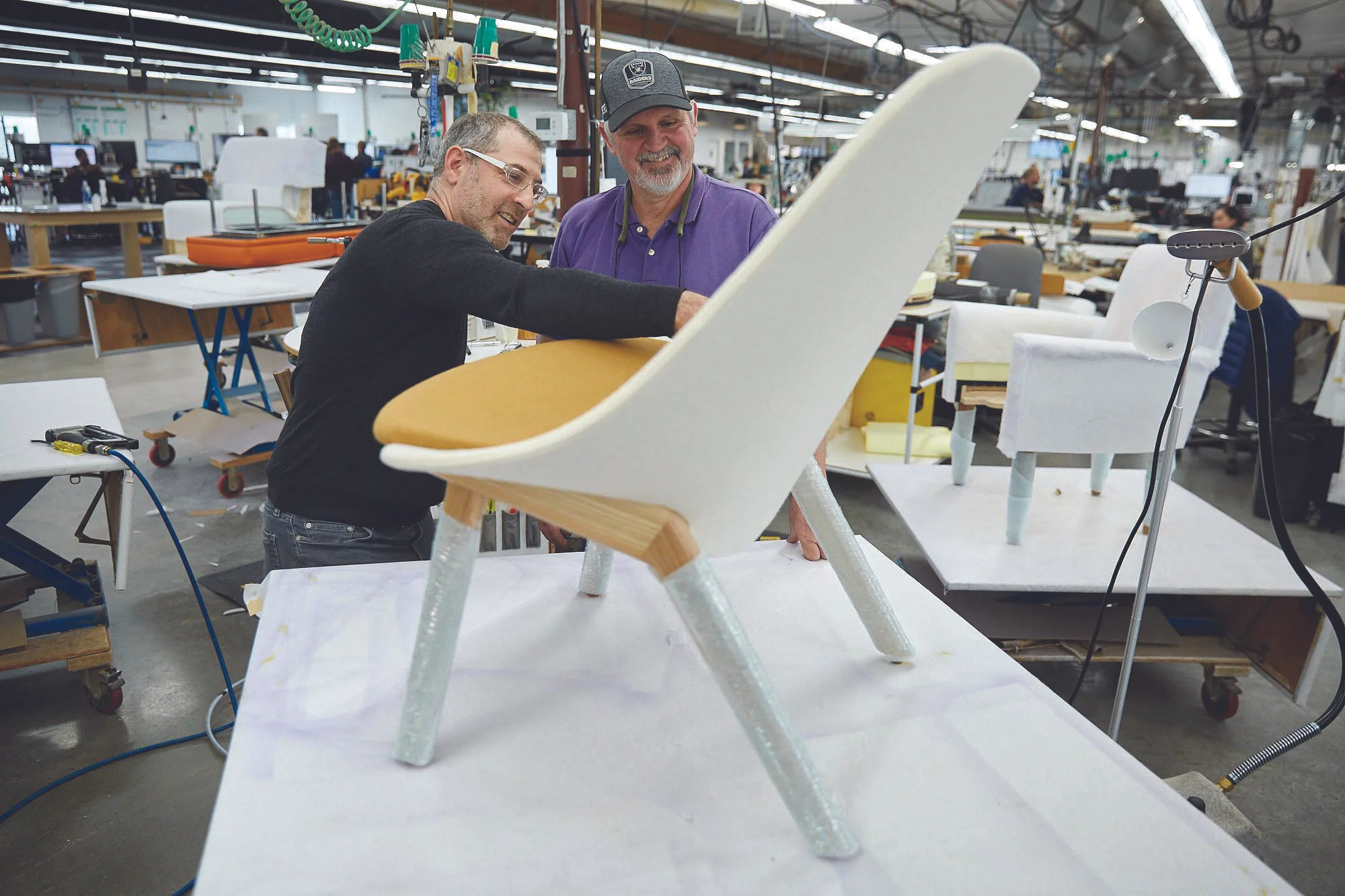Memo Furniture's strategy is simple. In a sea of sameness, it wants to use design as a differentiator. The Seattle-based furniture company certainly has the design chops to follow this path.
While you might not have heard of Memo Furniture, you probably know the names and faces behind it. Memo's founding partners, Bobby Holt, Lee Falck, Dave Simon and Gary Cruce, are a team of designers, entrepreneurs and business leaders whose relationship began in 2002 at Brandrud Furniture where they partnered to transform a small regional furniture company into a highly successful brand and operation known for its focus on design and innovation.
In 2008, Herman Miller acquired Brandrud and integrated the company into its emerging markets business. The group of colleagues went their separate ways following the sale, but each had it in mind they may reunite at some point.
After 10 years, they did just that, determined to do “something memorable” and create furniture that was needed in the industry for shared and transitional spaces.
“During the course of those years apart, we always stayed in touch,” said Simon, adding that a few of them joined Herman Miller, and Cruce worked with Nemschoff. “We ultimately thought of a lot of different things we could do as a team, and we really began to strategize and conceptualize where we would head.”
Cruce comes from the world of architecture. Simon worked at Metro before joining Brandrud. Each of the Memo executives brings a different skill to the table, but all have the same goal — to study where the market is headed and find where the company's capacity to serve can be found. Those ideas coalesced into creating furniture for shared and social spaces.
Memo Furniture competes in the upper end of the market with design at the forefront of everything the company does. So far, it has three major collections of furniture: Penna, Chroma and its latest, Chord.
Chord tables are the company's first collaboration with Brooklyn-based, multi-disciplinary design studio Standard Issue. In developing the concept for Chord, Standard Issue sought to express materiality under a new methodology. Creative Director and co-founder Michael McGinn said, “We employed a thematic idea for Memo called 'materials landscape' — the ability to create a composition of color and texture within a single object.”
Available in personal, side and coffee table sizes, Chord's material offering allows for endless combinations and surprising pairings; even an open tray option that enables storage for personal items like keys, phone and other accessories. Frames are available in nine powder coat colors, while surfaces can be chosen in a wide variety of materials, including wood, quartz and Forbo linoleum.
“Working with a rich materials palette and allowing for a certain amount of serendipity were also important ideas that dovetailed nicely with the materials landscape theme,” said Henry Julier, Standard Issue designer. “This was the point of departure for Chord.”
Memo's desire to produce designs that honor the essential requires that materials and finishes are refined and well-matched to the Memo brand. Chord's materials were also intended to tell a story about Memo's roots in Seattle. “The ability to pair contrasting, natural materials — metal, wood, stone — is a nice metaphor for the Pacific Northwest, where mountains, ocean and the man-made meet in memorable ways,” McGinn said.
The development of Chord is indicative of how Memo works with its designers. McGinn and Sharon Gresh, founders of Standard Issue, formed a relationship with Memo Creative Director Dave Simon while consulting for Herman Miller. The Brooklyn design house first worked with Memo to design its logo and identity system. A product design brief then followed that ultimately led to Chord. “Standard issue's work with premium design brands and the combined talent of their team, made them a great candidate to respond to our brief,” Simon said. “Our prior work relationships further set the stage for the trust, discourse and tough decision-making required when seeking to achieve great design.”
Memo works with outside designers but gives them creative freedom. Simon said the company believes in letting the designers “be the authors” as Memo acts to steer the work as it evolves. It is the freedom that comes from being a small company. “For bigger players, there are risks involved in what they can do that can dilute the work,” Simon said. “Our investments are smaller, our scale is smaller.”
Working with different designers creates a richness in Memo's offerings, he said. Beautiful design also creates an emotional appeal with its customers.
“A lot of what we are trying to do is create our own voice when it comes to furniture design,” Cruce said. “We are being very strategic not to be market responsive. We are not having those conversations here. We are looking at a category and presenting the market with our take on it.”
Memo Furniture has four new collections in development. The company is on a three- to four-month cadence for new projects. It is working on a new product with Studio Gorm, the Eugene, Oregon, studio founded by John and Wonhee Arndt, who also designed the Penna lounge chair for Memo.
“Developing designs with Memo has been very fulfilling,” McGinn said. “It's nice to work with a client who revels in the minutiae of product development, understands the possibilities inherent within a manufacturing process, shares insights into the marketplace and is willing to have their assumptions challenged. Mostly it's great to be challenged.”
The company works primarily with outside manufacturing partners, the majority of whom are in the Pacific Northwest. It's working to expand its network of sales reps and is adding groups across the country.
It is also expanding its presence in a unique way — through a Seattle coffee company. Falck and Holt are partners in Fulcrum Coffee, and Memo's furniture was used to design the coffee house in collaboration with Maharam and Floss. The cafe has essentially become Memo's showroom and creates a casual, comfortable location to meet with customers.







